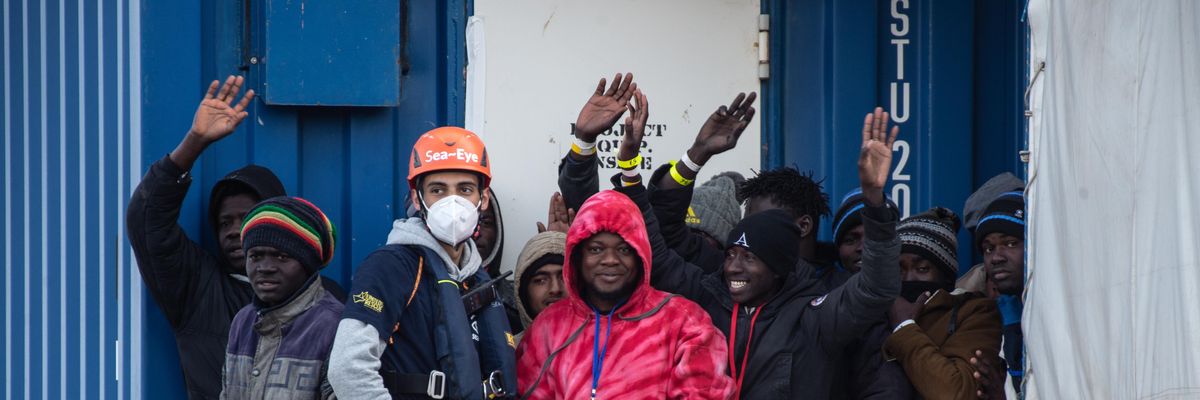Italy must stop criminalizing activists who are rescuing migrants at sea, a United Nations-appointed human rights expert said Thursday, ahead of a trial involving crew members from several non-governmental organizations.
"The ongoing proceedings against human rights defenders from search and rescue NGOs are a darkening stain on Italy and the E.U.'s commitment to human rights," Mary Lawlor, U.N. special rapporteur on the situation of human rights defenders, said in a statement.
Last May, preliminary criminal proceedings began at the Court of Trapani in Sicily against nearly two dozen individuals accused of collaborating with people smugglers. Four members of the luventa search and rescue crew and 17 activists from other civilian ships are being charged with aiding and abetting unauthorized immigration during several missions conducted in 2016 and 2017.
Before it was seized in 2017, the luventa, a former fishing vessel, had helped prevent roughly 14,000 asylum-seekers from drowning in the Mediterranean Sea.
“They are being criminalized for their human rights work," Lawlor said Thursday. "Saving lives is not a crime and solidarity is not smuggling."
According to the Office of the U.N. High Commissioner for Human Rights (OHCHR), "The proceedings have been plagued by procedural violations, including failure to provide adequate interpretation for non-Italian defendants and translation of key documents."
Last month, the office of far-right Italian Prime Minister Giorgia Meloni and Italy's Ministry of the Interior asked the court to join the case as plaintiffs, requesting compensation for alleged damages.
Meloni's fascist party, Fratelli d'Italia, is staunchly xenophobic and directs racist vitriol at Africans in particular. Like other reactionary nationalist parties in Europe, Fratelli d'Italia inaccurately depicts rape and violence against women as foreign imports brought in by immigrants, especially Black and Muslim men.
"States that respect human rights promote the work of human rights defenders," Lawlor said Thursday. "The government's decision to seek to join the case goes directly against this principle—it is a very disturbing sign."
Lawlor's statement was endorsed by Felipe González Morales, U.N. special rapporteur on the human rights of migrants.
As the OHCHR noted:
The case against the Iuventa crew has proceeded [against] the backdrop of new restrictions imposed by the Italian authorities on civilian search and rescue. Since December 2022, NGO ships have consistently been instructed to disembark rescued persons in north and central Italy ports—several days of sailing away from rescue sites in the Central Mediterranean Sea. The practice has been accompanied by new regulations for civilian search and rescue introduced by legislative decree on January 2, 2023. Under the new rules, NGO captains are effectively prevented from carrying out multiple rescues in the course of a mission and must navigate towards the indicated port of disembarkation without delay, or face heavy sanction.
"The new legislation and instructions on ports of disembarkation are obstructing essential activities of civilian rescue ships," said Lawlor, who has shared her concerns directly with Italian authorities. "They are widening the search and rescue gap in the Central Mediterranean, putting lives and rights at further risk."
"The legislation is incompatible with Italy's obligations under international law," she added, "and must be repealed."
